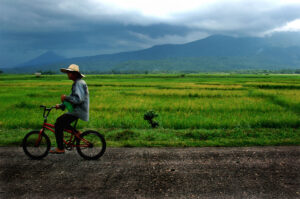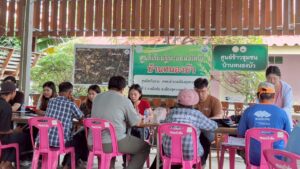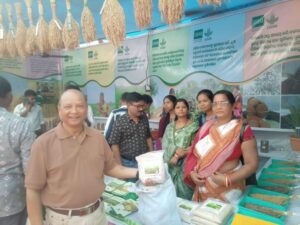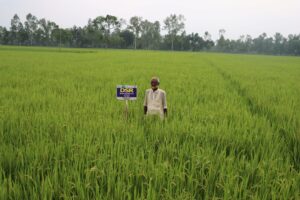Ankita Tiwari* and Dr. Shalini Gakhar**
Despite continuous advancements in agricultural technologies, there exists a significant digital gender divide globally, especially in rural and marginalized communities. Women farmers often face limited access to mobile phones, internet connectivity, digital literacy, and tailored training programs. These barriers constrain their ability to adopt climate-smart practices, access market information, and make informed farming decisions.
Excluding women and girls from the digital transformation not only perpetuates existing inequalities but also limits the full potential of agricultural innovation, productivity, and resilience.
As we celebrate International Girls in ICT Day, we must reflect on the importance of bridging the digital gender divide in the present technology-driven world. This year’s theme, “Girls in ICT for Inclusive Digital Transformation,” stresses that true progress in digital development must include everyone, especially girls and women who remain underrepresented in science, technology, engineering, and mathematics (STEM).
To accelerate this shared vision, the International Rice Research Institute (IRRI) is advancing gender-inclusive digital agriculture to drive meaningful impact. Across Asia and Africa, IRRI is leveraging information and communication technologies (ICTs) to empower women and girls as users, contributors, and leaders of agricultural innovation.
IRRI in Action: Empowering Women and Girls Through ICT in Agriculture
Digital tools such as mobile advisory services, remote sensing, and AI are revolutionizing agriculture and allied sectors, making them more data-driven and climate-responsive. However, the effectiveness of these technologies depends on equitable access and representation among women and girls, who often play central roles in food production and household farming decisions.
IRRI works across multiple countries to integrate ICTs into agricultural development, ensuring gender responsiveness at every stage—from tool design to deployment. Our initiatives span five major areas, each designed to drive impact, innovation, and inclusivity in the intersection of ICT and agriculture:
- Bridging the digital gap through capacity development initiatives
Targeted training programs for women farmers, extension workers, and youth, including digital literacy workshops and app-based learning sessions, are delivered to strengthen sector-specific competencies. These efforts enable women to effectively navigate and utilize ICT tools for crop health monitoring, weather forecasting, and input optimization.
E-extension platforms and WhatsApp-based advisory services (accessible to women farmers in local languages) have been developed in Odisha and Bihar (India), in collaboration with state governments.
Building digital skills among women is essential for effectively utilizing ICT in agriculture. CGIAR’s Initiative on Digital Innovation has partnered with organizations to provide training programs that enhance women’s digital competencies. These programs focus on practical skills, enabling women to use digital tools for data collection, decision-making, and accessing market information. - Championing women and girls in STEM: From learners to leaders
Within IRRI, we actively support young women scientists, data analysts, geospatial researchers, and ICT specialists, offering mentorship and equal opportunities for professional growth. Our commitment to gender diversity is reflected in women-led innovations in digital agriculture, like:
- AgDay app: A data-driven API and mobile application designed to give farmers precise recommendations on optimal planting dates, particularly for rice cultivation in Bihar. Developed by IRRI under the Excellence in Agronomy (EiA) initiative by One CGIAR with Bihar Agriculture University (BAU) and JEEVIKA-Bihar, the app was initiated last year in 190 locations in six districts of Bihar and 108 women farmers have been trained to date, further accelerating the adaptation of the app within their communities. This initiative is not just empowering small and marginalized farmers to lead innovations in timely plantation management, but also enabling women to become the agents of change. “Convergence with partners and involving women and communities resulted in the development of an inclusive demand demand-driven API. It is important to involve women, their perspective, needs, and aspirations while designing digital tools so that it is readily used by them” – Dr. Sugandha Munshi, Senior Associate Scientist -SFP Gender focal point AOW1.
- Rice Crop Manager (RCM): A decision-support tool co-developed with public-sector partners available in three states across India (Odisha, Bihar, eastern Uttar Pradesh), the Philippines, Indonesia, and Bangladesh. IRRI emphasizes the importance of designing digital tools that cater to the specific needs of women farmers. This involves engaging women in the development process to ensure tools are user-friendly and address their unique challenges. RCM tool has been adapted to include offline capabilities and simplified interfaces, making it more accessible to women with limited digital literacy.
- WeRise (Weather-rice-nutrient integrated decision support): A tool developed under the JICA-IRRI partnership for rainfed rice areas in Southeast Asia, with training modules designed to engage women farmers directly.
- AgDay app: A data-driven API and mobile application designed to give farmers precise recommendations on optimal planting dates, particularly for rice cultivation in Bihar. Developed by IRRI under the Excellence in Agronomy (EiA) initiative by One CGIAR with Bihar Agriculture University (BAU) and JEEVIKA-Bihar, the app was initiated last year in 190 locations in six districts of Bihar and 108 women farmers have been trained to date, further accelerating the adaptation of the app within their communities. This initiative is not just empowering small and marginalized farmers to lead innovations in timely plantation management, but also enabling women to become the agents of change. “Convergence with partners and involving women and communities resulted in the development of an inclusive demand demand-driven API. It is important to involve women, their perspective, needs, and aspirations while designing digital tools so that it is readily used by them” – Dr. Sugandha Munshi, Senior Associate Scientist -SFP Gender focal point AOW1.
- Empowering communities with digital tools and innovations
In Sub-Saharan Africa, IRRI and partners have launched the RiceAdvice app—a tablet-based decision-support tool that helps farmers optimize fertilizer use and increase productivity. In Nigeria, over 30% of trained users are women, demonstrating how localized ICT tools can overcome gender barriers when outreach is intentional and inclusive.
Similarly, in Senegal, IRRI collaborates with local organizations to introduce remote sensing tools and digital dashboards that help women and men manage irrigation and disease risks. These tools are accompanied by community-based training sessions that prioritize the inclusion of female farmers and youth.
The RCM tool was evaluated in India and Indonesia using CGIAR’s Multidimensional Digital Inclusiveness(MDII) framework. This framework provided a structured approach to assessing the effectiveness, adoption, and inclusivity of the RCM tool, ensuring that the analysis captured both its market relevance and its socio-economic impact on farmers in the surveyed regions. - Fostering digital inclusion through policy advocacy and partnerships
Collaborations among research institutions, governments, and non-governmental organizations (NGOs) are crucial for creating an environment that fosters women’s digital inclusion. For instance, IRRI has collaborated with multiple partners to develop gender-responsive strategies, including providing women access to digital advisory services and incorporating gender considerations into agricultural policies and practices. - Offering system-level change through science programs and accelerators
IRRI is engaging in multi-stakeholder coalitions to advocate for inclusive digital agriculture policies. Our work with governments and organizations, such as CGIAR’s Excellence in Agronomy, Digital Innovation Initiative, and GENDER Platform, ensures that technology deployment strategies are gender-transformative, addressing the root causes of exclusion and promoting women’s leadership in innovation ecosystems.
CGIAR’s new GESI Accelerator and Digital Transformation Accelerator embody a transformative vision, one where gender equality, digital empowerment, and inclusive innovation are no longer peripheral goals but central drivers of agricultural research for development. Together, these accelerators offer a system-level approach: transforming how agricultural science is designed, delivered, and scaled.
“Advancements in digital agriculture are reshaping how we address food security, climate resilience, and productivity in rice-based systems. However, realizing the full potential of this transformation requires an intentional focus on gender inclusion within ICT ecosystems, a challenge that persists across much of the Global South. At IRRI, we recognize that the gender digital divide is not merely a social issue; it is a structural constraint to the equitable dissemination and uptake of innovation. Our work focuses on embedding gender-equity principles into the design, deployment, and scaling of digital tools and platforms. Upcoming tools are undergoing gender-responsive usability testing, focusing on literacy levels, device access, and intra-household decision dynamics. Offline capability integration and multilingual interface design are examples of refinements based on this analysis.
As we commemorate Girls in ICT Day, we reinforce our commitment to designing ICT ecosystems where women are not passive users but active architects of digital innovation.”
— Shalini Gakhar, Data Scientist and Focal Point: CGIAR-Digital Innovation Accelerator, IRRI.
“Digital transformation in agriculture is not sustainable if it leaves women and youth behind. Bridging the digital divide requires more than reaching a few target farmers—it means co-designing with communities, valuing diverse knowledge, and embedding inclusion from the ground up. When intentional, inclusion becomes a driver of systemic, lasting change.”
–Niyati Singaraju, Postdoctoral Fellow – Gender Research, International Rice Research Institute, India
Envisioning a more gender-responsive digital ecosystem
Women majorly contribute to and are the backbone of the agrifood systems, thus it is essential to hear and upscale the unheard voices to achieve inclusive digital transformation and address the challenges contributing to the digital divide gap. Creating opportunities and equal access to digital education, mentorship programs, and innovation hubs for girls and women in STEM, as well as the marginalized communities, is an important and strategic step to build a resilient, responsive and empowered society.
With technology evolving and innovations growing at an unprecedented rate, it is impossible to attain sustainable and equitable development if we leave out a significant part of the population, especially women, from the digital mainstream.
A digitally transformed food system must reflect the diversity of the communities. In light of this fact, girls in ICT should not be celebrated for one day but empowered every day to shape and lead the way toward a smarter, more just, and sustainable future.
*Specialist- Communications, IRRI
**Data Scientist and Focal Point: CGIAR-Digital Innovation Accelerator, IRRI






